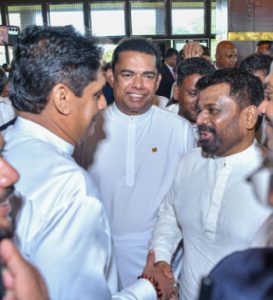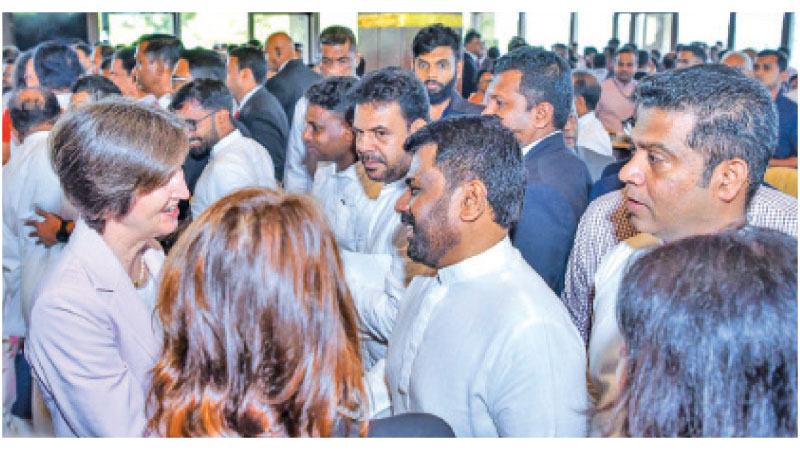The ceremonial opening of the First Session of the Tenth Parliament commenced on Thursday (November 21) sans the usual pomp and pageantry on the instructions of President Anura Kumara Dissanayake without formal military honours, gun salutes or motorcades. Amid the landslide victory achieved by the National People’s Power (NPP) at the November 14 general election, the ceremonial opening of the Tenth Parliament was a solemn ceremony, depicting the President’s and his Government’s sincere commitment to fulfill the aspirations of the people as they had pledged.
 The general election held on November 14 marked a significant shift in the country’s political landscape, with the NPP led by President Dissanayake, securing a landslide victory of two-thirds majority in Parliament. As a notable feature, the vast majority of more than 140 of the elected MPs in the Tenth Parliament are first-time Parliamentarians.
The general election held on November 14 marked a significant shift in the country’s political landscape, with the NPP led by President Dissanayake, securing a landslide victory of two-thirds majority in Parliament. As a notable feature, the vast majority of more than 140 of the elected MPs in the Tenth Parliament are first-time Parliamentarians.
Following the sounding of the quorum Bell at 9.55 a.m. on Thursday, Parliament convened at 10.00 a.m. After placing the mace in the Chamber, the Secretary-General of Parliament presented the Extraordinary Gazette Notifications issued by the President, setting the date and time for the session, as the first Order of Business.
The Speaker was elected as per the provisions of Article 64(1) of the Constitution and Parliamentary Standing Orders 4, 5, and 6. Subsequently, the Speaker took the oath, followed by Members of Parliament taking their oaths, and thereafter, the Deputy Speaker and Deputy Chairperson of Committees were elected. On the first day, Members were free to sit in any seat of their choice, as no seating arrangements were pre-assigned, which was a unique feature.
New Speaker
During the inaugural session, NPP Parliamentarian Dr. Asoka Sapumal Ranwala was unanimously elected the new Speaker of Parliament. The appointment of Dr. Ranwala was proposed by Prime Minister Dr. Harini Amarasuriya and seconded by Minister Vijitha Herath. Thereafter, the newly elected Speaker was escorted to the Speaker’s Chair by Prime Minister Amarasuriya and Minister Vijitha Herath, in accordance with Parliamentary tradition. The Speaker delivered a brief vote of thanks pertaining to his appointment followed by the Speaker taking his official oath in front of the Secretary General. Following the election of the Speaker, Members of Parliament were sworn in and took their official oaths.
Dr. Rizvie Salih was unanimously elected Deputy Speaker. His name was proposed by Minister Dr. Nalinda Jayatissa and seconded by MP Saroja Paulraj. MP Hemali Weerasekara was elected Deputy Chairperson of Committees. Her name was proposed by Minister Sunil Handunneththi, and seconded by MP Samanmalee Gunasinghe. The significant feature in the appointments was that all three elected to the high offices were first time members of Parliament, which is an unprecedented occurrence in Sri Lanka’s parliamentary history.
Prime Minister Dr. Harini Amarasuriya, Leader of the Opposition Sajith Premadasa and SLMC Leader MP Rauff Hakeem congratulated the new Speaker. The Premier said throughout his political career, Dr. Ranwala has appeared for a clean political culture and he is the most suitable person for the post of the Speaker. She said that Parliament has lost the trust of the people in the recent past. Therefore, the role of reposing public confidence in Parliament is vested with the new Speaker.
Premier Amarasuriya said that it is the responsibility of the new Speaker to protect the dignity and decorum of Parliament and make it a place that represents the people. Opposition Leader Sajith Premadasa said that he wishes the Speaker to act constitutionally and democratically in Parliament in the future.
In his address, the Speaker expressed his commitment to safeguarding the independence and dignity of Parliament as the supreme legislative body of the nation. He pledged to uphold the Parliamentary traditions and procedures while striving to create a model, Parliament. The Speaker sought the cooperation of all Members of Parliament to ensure that the institution operates effectively embodying the new political culture expected by the public. He emphasised the importance of a well-structured Parliamentary Committee system and called on all Members to conduct themselves with decorum and discipline during Parliamentary proceedings.
After that, the Speaker told Parliament that Minister Bimal Rathnayake has been appointed the new Leader of the House, and Minister Dr. Nalinda Jayatissa has been appointed the Chief Government Whip. The Speaker also told Parliament that the nomination of SJB Leader Sajith Premadasa, has been accepted as the Opposition Leader of the 10th Parliament of Sri Lanka.
President’s Policy Statement
Following the election of the Speaker, Deputy Speaker and Deputy Chairperson of Committees, Parliament was temporarily suspended before it reconvened at 11.30 a.m. to deliver the President’s Policy Statement.
The Speaker and the Secretary General of Parliament Mrs. Kushani Rohanadeera, welcomed President Anura Kumara Dissanayake near the main staircase of Parliament. The President was then escorted to the special room by the Serjeant-at-Arms and Deputy Serjeant-at-Arms, thereafter leading the procession carrying the mace, followed by the President, Speaker, and the Secretary-General. Delivering the Policy Statement from the Speaker’s Chair, President Dissanayake outlined the Government’s vision and future policy direction, in accordance with Articles 32(4) and 33 of the Constitution. The President said, “Today is an exceptionally significant day in the history of our Parliament. For decades, political power in our country shifted back and forth between the two main camps. However, during the last Presidential and general elections, that political power was entrusted to us in the new camp. This marks a monumental moment in the history of Sri Lanka’s Parliament.”
Key aspects
He said, “This mandate is a comprehensive one, encompassing numerous key aspects. This Parliament now includes the highest number of representatives ever elected under a singular mandate under our country’s established electoral system. This is a numerically significant achievement. However, beyond its quantitative value lies a qualitative strength: for the first time in a long while, the public mandate has brought about a political transformation that enabled the formation of a new Government. People from all provinces—North, South, East, and West—representing diverse communities, contributed to this mandate.”

The President in conversation with Opposition Leader Sajith Premadasa
President Dissanayake said the respect and honour once associated with this Parliament have steadily deteriorated. What was once a revered institution has now become an object of public distrust, hostility and contempt? It is seen as an adversary by the people, a body they feel disconnected from and disillusioned with. I do not believe that such a Parliament is fit to govern, lead, or wield the sovereign power of the people. A Parliament like that is no longer fit to exercise financial control on behalf of the people. Nor is it suitable to continue drafting laws on behalf of the public.
The President said the primary mission of this Parliament must be to restore its dignity and uphold its superior status as an institution. At this critical juncture, restoring the dignity and supremacy of Parliament should be a top priority. Today, this Parliament includes a significant number of new members. This offers an opportunity to establish good practices swiftly and effectively. I believe our current Speaker, the parliamentary staff, and all elected members have a crucial role in revitalising this Parliament. Together, we must re-establish it as a body that truly represents the people and regains the trust and respect it once commanded.
He said as representatives of the people, we must uphold the principle that everything we say, the way we behave, and the opinions we express are subject to public scrutiny. If anyone believes that being entrusted with power marks the end of accountability, they are mistaken. The public retains the authority to scrutinise us until the next transfer of power, the next electoral mandate. Therefore, I firmly believe that in the coming years, this Parliament can become one that successfully withstands public scrutiny. I look forward to the support and contributions of the Speaker and all Members of Parliament to achieve this task.
President Dissanayake said, “I believe that for an extended period, the political framework in our country, and the bases of political power, were often shaped along regional, ethnic, or religious lines. Such political divisions inevitably resulted in growing alienation among communities. Suspicion and mistrust among different groups grew. When racism becomes the cornerstone of a political ideology, the unavoidable outcome is the emergence of counter- racism from opposing groups. Racism in one part feeds and strengthens nationalism in another. This is a dynamic we have experienced throughout our country’s political and social history.
Profound gratitude
“Today, all communities across all provinces have trusted us and bestowed us this power. It is with profound gratitude that I extend my deepest respect and thanks to the people who trusted us. At the same time, I also acknowledge that there are sections of the population who did not trust us but instead placed their faith in other political movements. They, too, are an integral part of this democratic process.”
“Acceptance of a multi-party system is the nature of democracy. Democracy is not about uniting all people under a single party or a single ideology. The essence of democracy lies in the coexistence of diverse political ideologies and groups. It thrives on the presence of political factions with varying economic and political perspectives. As a democratic state, we do not advocate for one-party rule. Instead, we embrace multi-party politics as a core principle of our democratic framework.
“We are fully aware that there is a significant portion of the population who did not vote for us. It is the responsibility of our Government to represent and address the needs and aspirations of all citizens, regardless of whether they voted for us or not. Our commitment is to fulfill the expectations of every citizen of this nation,” the President said.
President Dissanayake said while we may hold diverse political opinions, I assure you with full responsibility that we will not allow a resurgence of divisive racist politics in our country. Similarly, no form of religious extremism will be permitted to take root. Our nation has endured immense suffering due to ethnic conflicts.
This soil has been soaked with enough blood, and rivers have flowed with the tears of countless people. Mistrust, suspicion, and anger among communities have grown to alarming levels. President Dissanayake recalled Martin Luther King’s words: “Darkness cannot drive out darkness; only light can do that. Hate cannot drive out hate; only love can do that.” The traditional tea party hosted by the President following the inauguration of the Tenth Parliament brought together key political figures from both the Government and the Opposition.






